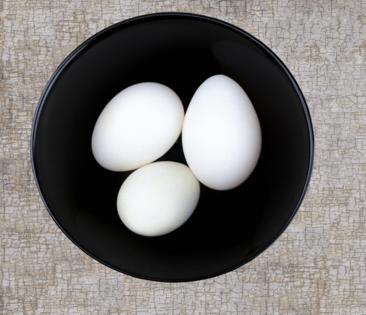On Nutrition: Delightful duck eggs
Published in Nutrition
The recipe called for 2 large eggs. And boy, did I have large eggs. My son-in-law had just given us a dozen duck eggs from one of his clients. (He’s a veterinarian.)
Duck eggs are definitely large — at least 50% bigger than chicken eggs. I wondered if they would also differ nutritionally. Here’s the comparison.
According to the United States Department of Agriculture Food Data Central, a cooked duck egg (2.5 ounces) contains 157 calories and 8 grams of protein. A large chicken egg (1.8 ounces) provides 78 calories and 6 grams of protein. Not surprisingly, duck eggs also have more fat and cholesterol than chicken eggs.
That said, they are also higher in several key nutrients, including calcium, iron, magnesium and vitamin B12.
When I cracked the duck eggs into a bowl, I immediately noticed the yolks were a deep shade of orange. As with chicken eggs, the color of the yolk is primarily due to the duck’s diet. Everything from corn to alfalfa to marigold petals provide plant pigments that color yolks yellow and orange.
And there’s some nutritional benefit here. These yellow and orange color pigments such as beta carotene, lutein and zeaxanthin act in our bodies as healthful antioxidants.
I can also attest that duck eggs have a slightly thicker shell. Some duck experts say this gives them a longer shelf life, although they still need to be refrigerated.
How do they taste? While some describe it as more intense, I didn’t notice. And because of their larger yolks, they tend to be creamier than chicken eggs.
Can you eat duck eggs if you are allergic to chicken eggs? Not always. Even though the types of proteins in these eggs differ, only a trained allergist can make that determination for any individual.
I even came across information about why someone might want to raise ducks for eggs. First of all, they are really cute when they waddle around the yard. And they generally lay eggs year-round while chickens sometimes slow down in colder months.
Ducks also love to eat slugs, mosquitoes and other bugs so they provide natural pest control, according to farmstore.com. And unlike chickens, they don’t need a special roost or nesting box to lay eggs. They like to lay their eggs on the ground.
My first experience cooking duck eggs did bring one surprise. My cowboy husband who eats with gusto just about anything I put in front of him was a bit squeamish when I suggested scrambled duck eggs for breakfast one morning.
So I did what any good wife would do. I blended them with other ingredients into a casserole we had for dinner.
I did not indulge my secret until after the meal when he enthusiastically said, “You need to keep this recipe! It was excellent!”
©2025 MediaNews Group, Inc. Distributed by Tribune Content Agency, LLC.










Comments